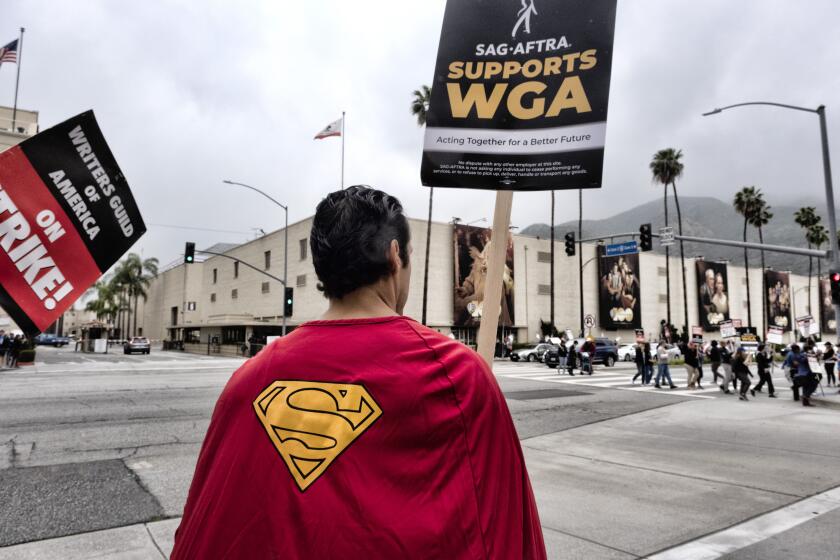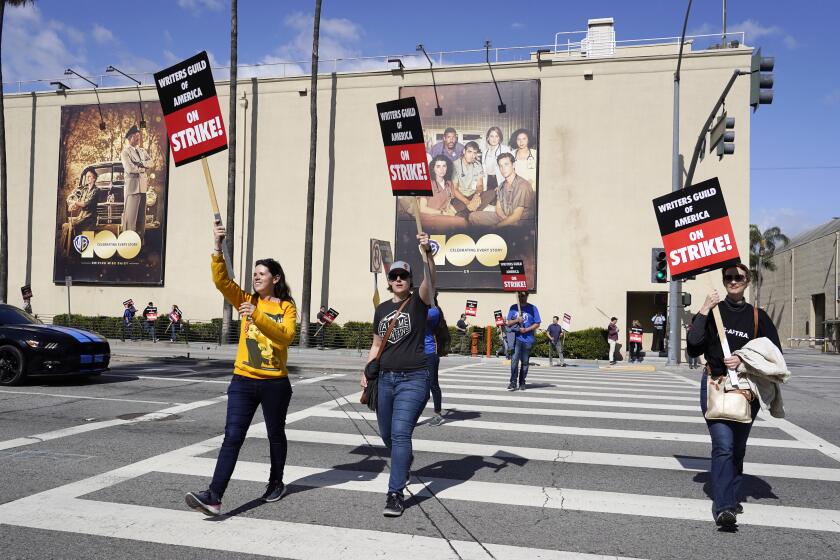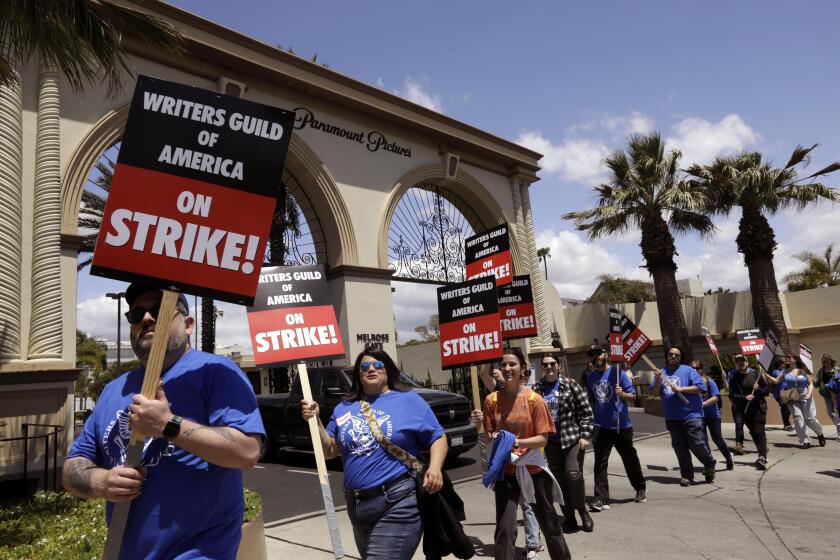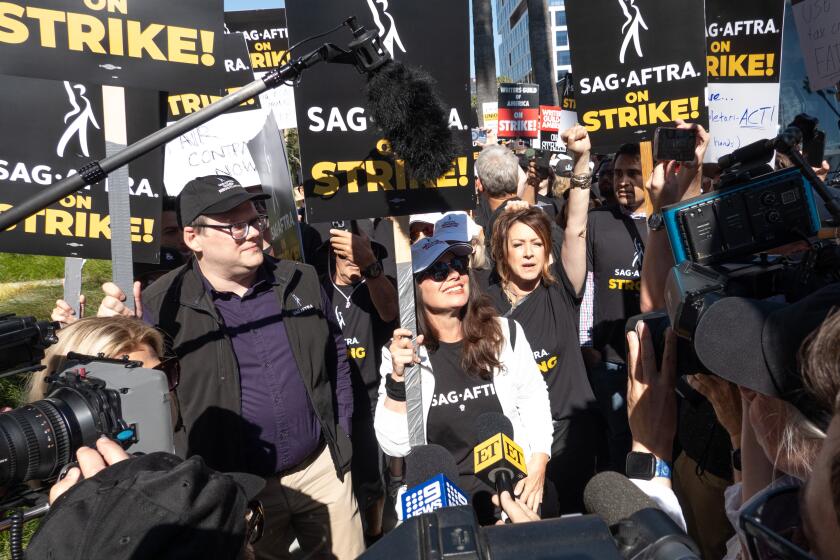Opinion: Hollywood strikes prove Netflix and other streamers have grown too powerful. Time to break them up
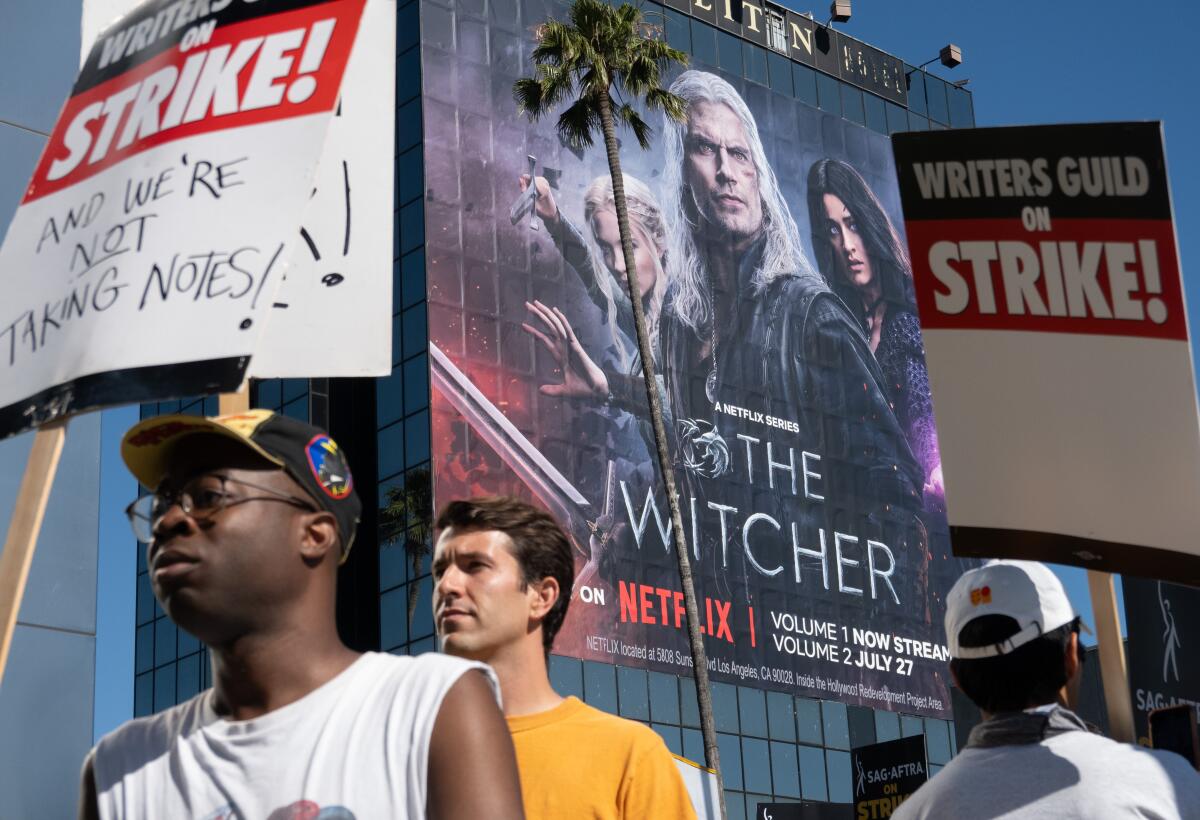
- Share via
The Hollywood writers’ strike is in its fourth month, and the actors’ strike is in its fourth week with no end in sight. Many have called the stalemate an existential crisis because it concerns new issues such as residuals from streaming services and rules for the use of artificial intelligence. These go beyond the usual labor issues such as wages and benefits and cut to the heart of an industry in which streamers such as Netflix can dominate all aspects of the business.
It shouldn’t fall entirely on labor to solve these problems, though. Antitrust laws need to be invoked — as they were in the 1940s in U.S. vs. Paramount — to break up streaming services that both produce content and distribute it. This vertical integration has deeply changed the longstanding entertainment industry ecosystem, which allowed employees to survive and studios to prosper.
The process of writing is not like an assembly line, and it can’t be squeezed into that model.
In recent decades, U.S. antitrust law has primarily taken aim at “horizontal monopolies” in which one or two huge companies dominate an industry and can force consumers to pay more. The vertical version — companies that control the supply chain from production to distribution, such as streaming services that also create content — hasn’t done that yet. In fact, subscription prices may have been initially underpriced to drive up demand, a practice called predatory pricing that also violates antitrust law.
Companies with this structure can wield outsize power in the industry, including against labor. As Federal Trade Commission Chair Lina Khan recently stated, this structure “can enable firms to exert market power over creators and workers alike and potentially limit the diversity of content reaching consumers.”
A profitable new normal has yet to reveal itself in the face of big tech changes, including AI. But to produce content, you will always need creators.
For most of the first half of the 20th century, the major film studios also controlled both production and distribution. The Justice Department sued the studios under antitrust laws to break up these anticompetitive entities. In 1948, the Supreme Court ruled against the studios, requiring them to divest themselves of their movie theaters if they wanted to continue in the production business.
Shortly thereafter, theatrical films began to be aired on television with no additional compensation for creative talent. This led to the strike by both the Writers Guild of America and the Screen Actors Guild in 1960, the last time the two struck simultaneously.
The USA Network show starring Meghan Markle blew up on streaming platforms. The paltry benefits for many involved underscore what’s at issue in the writers’ strike.
After a months-long standoff, a historic compromise was brokered by Actors Guild President Ronald Reagan (still a moderate Democrat) and MCA/Universal head Lew Wasserman. It established residuals for post-1960 films. The studios also contributed millions of dollars to a pension fund for talent and established new health and welfare protections.
The result was an industry ecosystem in which creative talent and technicians could earn a decent living and studios could be economically viable. The separation of the means of production and distribution stabilized the industry, allowing it to become one of America’s most culturally and economically important contributions to the world.
A CEO suggested the WGA strike would end soon because writers love working. Studies show passionate workers are the most likely to be taken advantage of.
With modifications for new technology like home video and pay TV, this ecosystem has survived until recently. Now, streamers, by controlling both content and distribution, have great power to cut compensation and alter creative rights. This is an unsustainable economic and cultural model.
It’s hard to see how the strikes can be settled equitably and a relatively fair system restored without again invoking antitrust laws to force giant entertainment companies to separate production from streaming distribution.
The need to protect creative diversity was one compelling reason behind the Justice Department’s successful antitrust lawsuit last year to block the $2.2-billion acquisition of major publisher Simon & Schuster by Penguin Random House. (A new deal to sell to the private equity firm KKR is unlikely to prompt antitrust scrutiny, although the debt often incurred by private equity may cause other problems.)
The historic dual strike by actors and writers in Hollywood is part of a much larger worker backlash against corporate greed.
Under both federal and California law, any person or business harmed by an anticompetitive practice can sue for an antitrust violation. That could include individual talent or the guilds — or better yet, the Justice Department or the California attorney general.
If Netflix and its streaming peers like Apple+, Amazon Prime, Disney+ and Max can maintain their vertical control, it will be next to impossible to settle the Hollywood strikes in ways that could preserve the ability of creators and technicians to earn a decent living and protect creative diversity. The old vertical studio system was broken up by the Justice Department. It may be time to do the same with these 21st century behemoths.
Miles Mogulescu is an entertainment attorney, former senior vice president of business affairs at MGM/UA and a co-director/producer of the labor history documentary “Union Maids.”
More to Read
A cure for the common opinion
Get thought-provoking perspectives with our weekly newsletter.
You may occasionally receive promotional content from the Los Angeles Times.
